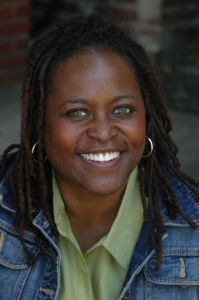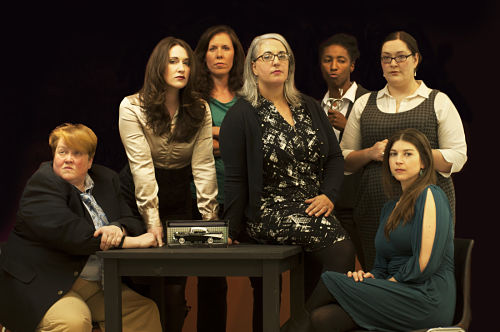When Stephanie Hickling Beckman began auditioning for acting roles following her arrival in Asheville, N.C., in 1999, she had many opportunities come her way. Unfortunately, most of the parts offered maids or Civil Rights activists.

“For a supposedly liberal town, things weren’t nearly as advanced in the theatre community as people made out,” Hickling Beckman remembers. Roles for actors of color were extremely limited, as were the imaginations of some established theatre artists. When a director wanted to cast her as Karen, one of the women who runs the girls’ boarding school in Lillian Hellman’s 1934 drama, The Children’s Hour, the theatre’s producer objected on the grounds that it would be historically inaccurate for an African-American to run a school in rural Massachusetts at the time the play is set. The director asked whether Hickling Beckman would be offended if he instead offered her the role of the play’s maid. She declined in no uncertain terms, the producer relented, and she ended up being cast in the original role.
That would be a happy ending if that were the ending. Instead, when the show opened, a local critic began his review by noting that it takes some serious suspension of disbelief to accept an African-American playing in her role. So much for colorblind casting.
Later, when she was grumbling about this narrow-minded attitude about casting, her mother threw down a gauntlet: “You can’t just complain unless you’re willing to do something about it.” The result was the formation in 2010 of Different Strokes! Performing Arts Collective Inc.
If the purpose of the arts is, as theorist Viktor Shlovsky once wrote, to “make the stone stony,” to “make objects unfamiliar” that over time have become invisible, Different Strokes! has made this the centerpiece of their work as it intersects with race, gender, and sexuality. Their work bends spectators’ perceptions just enough that they are able to see the unexamined assumptions that underlie daily life.
One thing that sets the company apart is that they focus not only contemporary plays exploring issues of diversity, but also on using multicultural casting in iconic stories to foreground issues of race, gender, and sexuality that would not have been noticeable in the play’s original context—not unlike Hamilton’s casting of actors of color as America’s Founding Fathers. In Different Strokes!’s recent production of David Mamet’s Glengarry Glen Ross, director Sean David Robinson decided to give the play an all-female cast. This not only made the play’s language seem even more abrasive than the original (“People told me, ‘Women don’t talk like that,’” Hickling Beckman says, and she told them, “I don’t know who you hang out with, but women I know sure do”). It also affected the audience’s perception of some of the characters.
“A character like Roma, when played by a man, just comes across as a typical successful businessman who does what he needs to do to make the sale,” says Hickling Beckman. “But when it was played by a woman, that character suddenly seemed manipulative, ruthless, and a flat-out bitch!” Thus audiences became aware not only of the violence of the world of sales, but also about the different ways we judge men’s and women’s behavior in the business world.

Similarly, the company’s production of Romulus Linney’s A Lesson Before Dying, which came with the subtitle (In Black and White), had two versions using the same actors: one with the roles cast according to traditional racial perceptions, the other with those reversed. The object was to provide the audience with varying perspectives on the same issue in regard to race and class. “Some audience members,” Hickling Beckman says, “couldn’t imagine the likelihood of that scenario of the reversed races. When it came to a white kid on Death Row, the closest they could come was to make it about class instead of race.” This, she said, “led to many interesting discussions.”
Similarly, in 2015, Beckman Hickling directed Neil LaBute’s The Shape of Things with two separate casts. While the role of Adam was played by a male actor in both versions, one was white and the other African-American, and the genders of the other characters were reversed in the different casts as well. Audience members were given the opportunity to see both versions back to back on Fridays and Saturdays, and many took advantage of this option to see how their reactions to the characters and story differed.
“In the cast where Adam was a white man who, as a school project, was dramatically recreated to be a significantly more socially acceptable version of himself, the catalyst for change was the woman he loved who left instantly when her project was complete,” Hickling Beckman explained. “When we recast our Adam as a black man, the same project was more than simply insulting—it was an act of white supremacy.” Further, she says, “The gender bend was one character that had an affair at one point with our Adam. One Adam had a steamy hookup with a woman, and the other Adam had a steamy hookup with a man.” She calls this “just a fun little twist, which produced an interesting discussion on sexual, and gender fluidity of our current college aged generation.”
Not surprisingly, most Different Strokes! performances are followed by a discussion with the audience. “It’s an important opportunity for the community to think aloud together about things we all too often ignore or don’t notice,” Hickling Beckman explains. Over the years, long-time spectators have grown more comfortable speaking about the hot-button issues being raised by the productions, which makes the discussions almost as crucial as the plays themselves.
In addition, most productions are teamed with a local charity, like Youth OutRight, Blue Ridge Pride, the Western North Carolina AIDS Project, Four Seasons Compassion for Life, the Center for Participatory Change, and many others, each of which receive a cut of box-office proceeds. This reflects Hickling Beckman’s belief that a theatre such as hers needs to be a theatre not only in the community but for it.
Their current production, which runs Nov. 3-19 at Magnetic 375 in the Asheville arts district, at first glance seems an unlikely one: an adaptation of George Romero’s classic horror flick Night of the Living Dead. But the focus of the production is not on the brain-eating zombies but on the racial and gender roles being played out in the farmhouse between Ben, Barbara, and the Coopers. “It’s a departure for us—or at least our audiences might think so, just from the title. But when they get there, they will discover a fresh take on the whole zombie thing. We want to broaden our audience so we can not only accommodate a bigger choir, but perhaps prompt people to join us who aren’t necessarily accustomed to singing. It’s time to take the next step.”
Part of the company’s next step involves finding a permanent space. As in many communities, the theatres available for rent in the rapidly expanding Asheville theatre scene are limited and quite expensive. Hickling Beckman says that a possible space has been located, but there is a long way to go before the details are sorted out. “This is the year we and our collective of other performing artists need to find that special theatre space that we can call our home,” Hickling Beckman says. “While we have begun discussions with one potential space, we are open to alternative ideas.” She adds that Asheville’s “thriving west side of town needs a local theatre, and our company does too. We are most open to any opportunities that may knock.”
Just so long as it’s not a brain-eater.
Scott Walters writes the “Creative Insubordination” column at Arts Journal. He is also a professor of Drama at the University of North Carolina at Asheville.


